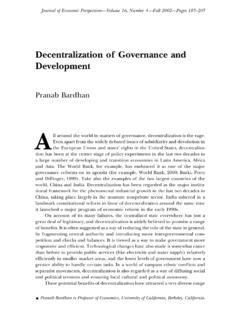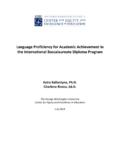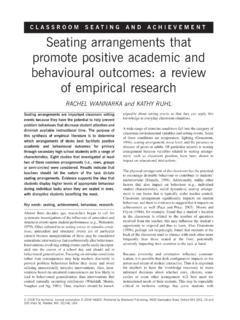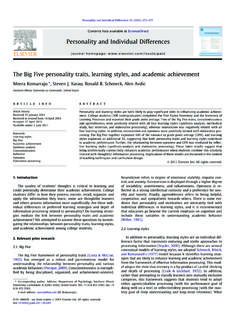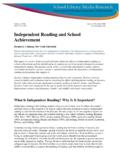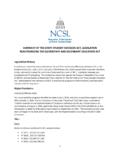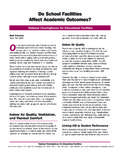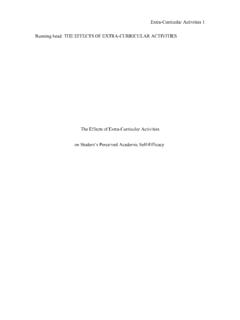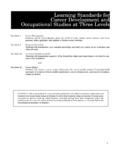Transcription of The Role of Moral and Performance Character Strengths in ...
1 The Role of Moral and Performance Character Strengths in Predicting achievement and Conduct among Urban Middle School Students In Press, Teachers College Record Scott Seider Boston University Jennifer K. Gilbert Vanderbilt University Sarah Novick Boston University Jessica Gomez Boston University 1 The Role of Moral and Performance Character Strengths in Predicting achievement and Conduct among Urban Middle School Students Executive Summary Over the past decade, a number of leading charter school networks have taken up Character development as a key lever in promoting student success.
2 This interest in Character development has focused primarily upon cultivating students Performance Character . Performance Character consists of the qualities that allow individuals to regulate their thoughts and actions in ways that support achievement in a particular endeavor. Examples of Performance Character include persistence, self-discipline and grit. Moral Character , on the other hand, consists of the qualities relevant to striving for ethical behavior in one s relationships with other individuals and communities. Examples of Moral Character Strengths include empathy and integrity.
3 The emphasis on Performance Character development at charter school networks such as the Knowledge is Power Program (KIPP) finds support in a sizable body of research demonstrating correlations between academic achievement and Performance Character Strengths such as persistence and self-discipline. In contrast, the relationship between student achievement and Moral Character Strengths such as empathy and integrity is more ambiguous. In the present study, however, we present data from three urban charter middle schools that reveal both Moral and Performance Character Strengths to be predictive of students achievement and conduct.
4 Our results point to the role that both types of Character play in predicting key student outcomes. This study s participants consisted of 488 early adolescents between the ages of ten and fourteen years old attending three charter middle schools in a large northeastern city. All three schools are located within a few miles of each other and admit students from any neighborhood 2 in the city through randomized registration lotteries. More than 90% of the students attending these schools identify as African American, Latino or multi-racial, and two thirds qualify for free or reduced price lunch (a proxy for low socioeconomic status).
5 Similar to schools in the KIPP charter network, all three schools in the present study can be characterized as No Excuses schools a term used to describe high-poverty public schools featuring a strict disciplinary environment, extended time in school, college preparatory mission and an intensive focus on traditional reading and mathematics skills. Students at all three schools completed surveys in the openings weeks of the 2010-2011 school year (Time1) and then completed a similar survey at the conclusion of the academic year in June of 2011 (Time2). The survey tool consisted of measures that were aligned with the Character Strengths cited as core values at one or more of the participating schools: courage, empathy, integrity, perseverance and social responsibility.
6 Also included on the surveys were demographic questions about students gender, race/ethnicity, grade level and feelings of school connectedness. Additionally, at the conclusion of the academic year, we collected from administrators at the three schools student-level data on academic achievement (grade point average) and student behavior (demerits) that served as the outcome variables in our analyses. For both of these outcomes, we fit quantile regression models that considered the predictive strength of our five Character Strengths of interest while controlling for participating students school attended, gender, race/ethnicity, grade level and feelings of school connectedness.
7 The final model for grade point average revealed that perseverance, school connectedness and grade level were significant positive predictors of student s academic achievement while integrity and demerits were significant negative predictors of student achievement . In sum, middle school students across the three schools who reported the highest 3 levels of academic achievement were also the students, on average, who demonstrated high levels of perseverance, felt highly connected to their school communities, received few demerits and demonstrated a weak commitment to academic integrity.
8 The Character Strengths of perseverance and integrity accounted for approximately six percent of the variance in academic achievement among middle school students in the sample. In terms of student conduct, participating students likelihood of earning demerits was significantly predicted by their grade level, grade point average, gender, race/ethnicity and commitment to acting with integrity. Most relevant to the present study was that, on average, the students who demonstrated the highest levels of integrity also earned the fewest number of demerits. In sum, students who possessed high levels of integrity were less likely to engage in the disruptive or anti-social behaviors that compromise their (and their classmates ) engagement in learning.
9 The Character strength of integrity accounted for approximately two percent of the variance in conduct among middle school students in the present study. The design of the present study cannot establish a causal relationship between students Character Strengths , academic achievement and school conduct. Moreover, the magnitude of the relationships between these variables is relatively small. Nonetheless, the results of the present study suggest that urban educators committed to cultivating students Character development would do well to target Moral Character Strengths such as integrity as well as Performance Character Strengths such as perseverance.
10 There are thousands of educators working diligently every day in settings similar to the schools in the present study to help their students from under-served urban communities develop the academic and social skills necessary to compete with youth from more affluent and better-resourced communities. If this work to close the achievement gap is to be successful, educators must draw upon every tool at their disposal to 4 support student success. The present study suggests that cultivating students Moral and Performance Character Strengths represent important tools in this endeavor.






